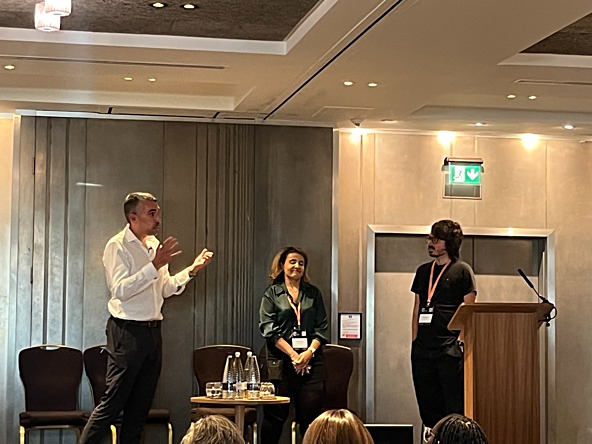Use behavioural science to personalise ads

Speaking at a session on the cost of ‘dull advertising’ at the conference in London last week, Alya Kubati, data and insights director at Sine Digital, said 27% of media spend worldwide is wasted on dull advertising that “that leaves no impression on you whatsoever”.
Kubati referenced research looking at creative assets in the theatre industry, using examples from the West End and New York’s Broadway, with Tris Baker, co-founder, Runaway Entertainment and the theatre producer behind the new Hunger Games experience and 2:22 A Ghost Story joining her on stage to discuss how better understanding human behaviours could improve advertising.
Specifically, Kubati said that personalised advertising could help theatre productions gain attention from the right audiences, arguing that researchers and advertisers needed to “step away from stereotypes [about their audiences] and see them from a deeper lens – see them as people, see them as their attitudes and their motivations”.
Adverts that were personalised cost 62% less to launch and maintain, Kubati added, arguing that they were cheaper in the long run “because the ROI is better; it is cheaper because you’re reaching the right audience with the right content at the right time”.
She said that this meant making advertising engaging and looking to play into behavioural science concepts to gain the right attention from the right audience.
“You are trying to convince people to leave their home, spend their money, go out in the cold, share their evening with someone and sit with strangers all in the name of art,” Kubati said. “It is not the easiest sell for some people, particularly if you can just watch something on Netflix at home.
“It is really important that we cultivate an emotional connection with our audiences from the very first touchpoint if we want to bring them into our space. To be able to do that effectively, you need to rethink how we look at how we look at ad creative in this industry. We need to see every ad as an invitation and try to make it unforgettable.”
Jake Bowser, chief technology officer Sine Digital, told the conference that the team had tagged the audiences and creative against behavioural science principles, and then examined how the underlying attributes performed in the real world, with ‘high arousal’ emotions boosting the view-through rate for adverts by 21%.
Humour could have a positive impact in the right circumstances, but there was a 22% reduction in the effectiveness of an advert is humour was used in more serious contexts.
He added: “Online attention space is very scarce, and online content is very abundant, and will only become more abundant with AI-generated content. How can we cut through in that environment, as people have a lot of other things they can be seeing at any one moment, and how we can use behavioural science to succeed in that mission?”
Based on analysis of more than 20,000 adverts since 2019 and 20 bn impressions, Kubati said that Sine Digital found that loud adverts aimed at extroverts were best performing, but that many advertisers were overlooking other positive traits, such as conscientiousness, which performed well in the longer term with other audiences.
Agreeableness, openness and neuroticism in theatre advertising works, for example. “We have barely scratched the surface with how ad creative can go,” said Kubati. “If we get a lot more personal, we will increase revenue but also connect with people in the live entertainment space.”
(Pictured: Tris Baker, Alya Kubati and Jake Bowser at MRS Behavioural Science Summit)

We hope you enjoyed this article.
Research Live is published by MRS.
The Market Research Society (MRS) exists to promote and protect the research sector, showcasing how research delivers impact for businesses and government.
Members of MRS enjoy many benefits including tailoured policy guidance, discounts on training and conferences, and access to member-only content.
For example, there's an archive of winning case studies from over a decade of MRS Awards.
Find out more about the benefits of joining MRS here.














0 Comments